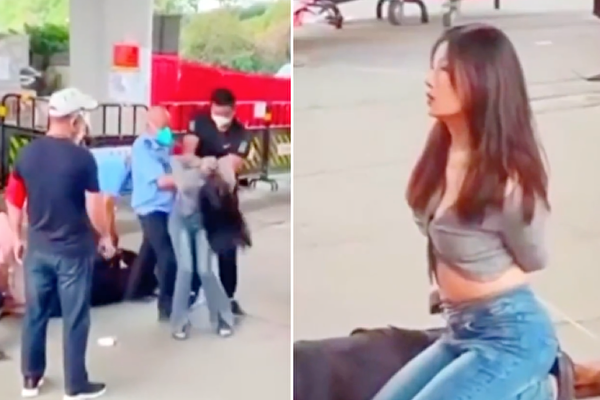At the beginning of 2022, a photo of a chained woman found in China’s Xuzhou city, a victim of human trafficking, went viral on social media. Recently, two women were tied up and shamed by COVID-19 policy enforcers in southern China’s Guangzhou city for violating strict pandemic rules, sparking a public outcry on Chinese social media.
U.S.-based China expert Tang Jingyuan pointed out that when the local authorities have the power to punish individuals without a trial, it indicates the Chinese Communist Party (CCP) has incited various groups to struggle against each other under its “modern governance” model.
According to Chinese media, the two women were picking up takeout delivered from a restaurant on Nov. 17, and one of them was not wearing a mask, causing a confrontation with workers enforcing COVID rules at a community checkpoint.
The local police department issued a notice the next day, claiming the two 23-year-old women, Wang and Li, attempted to force their way out of a checkpoint near the entrance of a residential community, ignoring pandemic protocols. It stated that Li was not wearing a mask, and her health code was yellow as a result of skipping required nucleic acid tests since Oct. 30. A yellow code results in restrictions such as not being allowed in certain public spaces.
The report claims that a group of COVID control workers “repeatedly advised“ Wang and Li during the confrontation, but the two women refused to cooperate. They allegedly insulted the staff and were later ”restrained and controlled.”

The video also shows that some onlookers intervened and asked the COVID staff to give the woman a mask and let her go, but they ignored them. Then one of the workers suddenly grabbed the black-clad woman wearing a mask and quickly tied up her arms and legs, forcing her to lie on the ground.
Abuse of Power
Regarding the incident, Tang believes the heated debate on Chinese social media revealed serious problems in law enforcement.In his YouTube program on Nov. 18, he said there are two opposing views and sentiments among the Chinese.
“One of the women broke public rules by not wearing a mask, and the two attempted to force their way out of the checkpoint. So, first of all, they violated the COVID rules; second, they insulted the staff. Therefore, when they were subdued and tied up, [some say that] it’s a good thing because they deserved it,” Tang said.
“The other view believes that although the two women violated the rules but did not commit any illegal acts that would endanger the public, the COVID staff did not have the right to enforce the law or restrict personal freedom, let alone humiliate them in public through violence.”
Tang said that of these two viewpoints, he agrees with the latter.
“The core issue of the incident lies in the law enforcement power, and the women’s violation of the COVID regulations is of secondary importance,” he said. ”But the latter argument is also incomplete; that is, the workers who carry out the pandemic measures in China have, in fact, been given a considerable degree of law enforcement power, although not explicitly. This is a very serious problem.”
Tang explained the argument between the women and the COVID control workers should be treated as a civil work dispute and conflict.
“However, when the staff threw the two women to the ground violently and used equipment to bind and restrain them, they were actually using law enforcement power targeting criminal offenses.”
Tang further pointed out that only law enforcement officers have the power to restrict personal freedom when carrying out their official duties, and the power to use force to subdue and restrain suspects when necessary.
‘Modern Governance’
The CCP’s State Council issued a document on April 28, 2021, stating that to strengthen and modernize grassroots agencies, the central authorities had decided to give administrative and law enforcement powers to the townships and neighborhood committees.“This document may seem insignificant, but it is a major change in the political structure under the Chinese Communist Party,” said Tang.
He explained that in Chinese history, law enforcement power has never been delegated below the county level. After the CCP seized power in mainland China in 1949, neither the communities nor the townships had direct administrative and punitive powers, and their function was to pass on directives from the upper level to lower levels. He said the new document has since given law enforcement power to grassroots agencies that should not handle legal cases.
As such, the grassroots level now has the right to summon, arrest, and interrogate citizens within its jurisdiction, Tang said.
“This is the same concept as ‘the authoritarian governance by the masses’ in the Cultural Revolution, only under a new cloak of ‘modern governance.’ This approach was actually meant for the Party to mobilize a group of politically reliable citizens at the bottom of the society to carry out the Party’s will.”
Today, the CCP’s zero-COVID policy must be strictly enforced, and anyone charged with “sabotaging epidemic prevention” can be subjected to arbitrary punishment, according to Tang.
“The two women being tied up and having to endure public humiliation is an example of ‘the authoritarian governance by the masses,’ as the current pandemic control is also a revolution that calls for civilians’ participation at the grassroots level,” he said.
“The Pandora’s box has been opened, and it’s just a matter of time before the evil inside is gradually released.”






